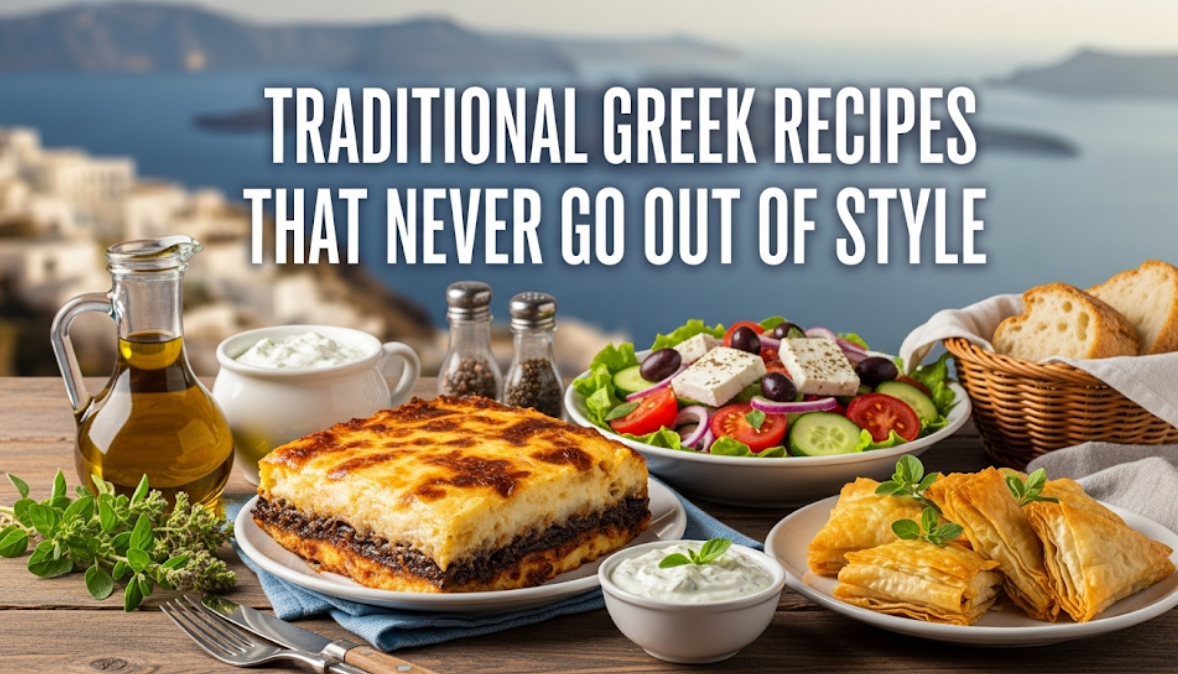Greek food has been capturing hearts over thousands of years and there is a reason to it. These ancient recipes unite families in dinner tables in Athens or in New York City. Whether you are in the mood of the delicacy of warm moussaka or the freshness of a Greek salad, these recipes have withstood time, since they are just good.
It is not only about food but tradition, love, and unity of people which is what Greek cooking is. Each dish has a story behind it about how the Greek grandmothers have passed the recipes down through the centuries and know how much olive oil to pour over and what herbs to add into each dish to make it sing. We are going to discuss the most popular Greek dishes that to this day attract the palates of people all over the globe.
The Secret of Greek Food
Greek food is based on fresh and simple foods that are complementary to one another. Greek climate is the Mediterranean which produces incredible olive oil, ripe tomatoes, fresh herbs, and seafood in abundance. All great Greek dishes are based on these natural gifts.
The Greek food is special because of the balance of flavors. In most recipes, you will have the tang of lemon juice, the richness of olive oil, the freshness of herbs, such as oregano and parsley and the creamy consistency of feta cheese. The combination makes the dishes familiar and exciting.
The Major Ingredients That Render Greek Food Spectacular
Greek cooks have never doubted the value of using what nature offers. The following are the star ingredients that seem to be found in almost all traditional recipes:
Olive Oil: This liquid gold does not only add flavor but it is the key to the Greek cooking. Greeks apply olive oil in dressing their salads and also cooking vegetables.
Fresh Herbs: Oregano, parsley, dill and mint are in the wild in Greece and bring unbelievable freshness to all meals.
Lemon: Lemon in Greece is known to be very tangy and zesty and it adds flavor to everything.
Feta Cheese: This is a creamy, salty cheese that has been produced in Greece over the centuries and it is used to enrich salads, pies, and even main courses.
Fresh Vegetables: Tomatoes, cucumbers, onions, as well as peppers are the core of most of the Greek dishes.
Quick Dishes That Make an Opening to Each Meal
Greek dishes are usually served on small dishes known as mezze. These snacks are ideal to share and bring people together before the actual meal comes in.
Tzatziki: The Best Greek Dip
The world may know tzatziki as the most popular Greek appetizer. This smooth cucumber and yogurt sauce is ideal with pita bread, roast meat or fresh vegetables.
What You Need:
- 2 cups Greek yogurt
- 1 large cucumber, grated and drained
- 3 cloves garlic, minced
- 2 tablespoons olive oil
- 1 tablespoon lemon juice
- 1 tablespoon fresh dill
- Salt to taste
How to Make It: Mix all ingredients in a bowl and refrigerate at least one hour. The flavors are improved by sitting with each other. This dip lasts up to three days.
Spanakopita: Spinach Pie That Melts in Your Mouth
Spanakopita is a blend of phyllo pastry that is flaky and a filling of spinach and feta. Each bite is the ideal combination of textures and flavors.
What You Need:
- 1 package phyllo pastry
- 2 pounds fresh spinach
- 1 cup crumbled feta cheese
- 1 large onion, chopped
- 3 eggs
- 1/2 cup olive oil
- Fresh dill and parsley
- Salt and pepper
How to Make It: Sauté spinach and onion until tender and combine with cheese, eggs and herbs. Place half the phyllo sheets in a baking dish and then the filling, then the rest of the phyllo. Apply olive oil and bake until it is golden.

Principal Dishes Which Characterize Greek Food
Main dishes of Greeks are nourishing, tasty, and intended to nourish families. These recipes are centuries old and they are equally popular today.
Moussaka: The Greek Lasagna
Moussaka is likely the most well-known Greek main dish. It is a sophisticated-looking dish with multiple layers, made of eggplant, meat sauce, and a creamy béchamel sauce that makes it both comforting and fancy to eat.
What You Need:
- 3 large eggplants, sliced
- 1 pound ground lamb or beef
- 1 large onion, chopped
- 2 cans crushed tomatoes
- 1/2 cup red wine
- For béchamel: flour, milk, butter and cheese
- Olive oil, herbs, and spices
How to Make It: Salt the eggplant slices and leave to drain 30 minutes and fry until golden. Prepare the meat sauce with ground meat cooked together with onions, tomatoes, and wine. To prepare the béchamel sauce, melt butter, then add flour, followed by the milk little by little until it is thickened. Layer all in a baking dish and bake approximately 45 minutes.
Souvlaki: Perfect Grilled Pieces of Meat
Souvlaki is served as Greek street food in your backyard. These are skewers of marinated meat, which are easy to prepare but rich in flavor.
What You Need:
- 2 lbs of pork, chicken or lamb pieces, cubed
- 1/4 cup olive oil
- Juice of 2 lemons
- 3 cloves garlic, minced
- 1 tablespoon oregano
- Salt and pepper
- To serve: pita bread and tzatziki
How to Make It: Meat should marinate at least 2 hours or overnight. Place on skewers and grill 10-15 minutes, turning every now and then. Eat with warm pita bread, tzatziki, and fresh vegetables.
Greek-Style Baked Fish
Greeks have been fishing the Mediterranean over thousands of years and thus, they know how to make seafood just right. This baked fish dish is easy yet it is very delicious.
What You Need:
- 2 pounds whole fish or fillets
- 4 tomatoes, sliced
- 1 onion, sliced
- 1/4 cup olive oil
- Juice of 1 lemon
- Fresh herbs (oregano, parsley)
- Salt and pepper
How to Make It: Layer fish with tomatoes and onions. Add olive oil and lemon juice, herbs and spices. Bake at 400°F approximately 25 minutes until fish flakes.
Salads That Glorify Fresh Food
Greek salads are not only a side dish but a feast of fresh, seasonal produce that has a taste of sunshine.
Greek Village Salad (Horiatiki)
This is not a normal restaurant Greek salad. The village original lacks lettuce and only includes fresh vegetables, feta and olives.
What You Need:
- 4 large tomatoes, cut in wedges
- 1 cucumber, sliced
- 1 red onion, thinly sliced
- 1 green pepper, cut in rings
- 1/2 cup Kalamata olives
- 4 oz feta cheese, in chunks
- 1/4 cup olive oil
- 2 tablespoons red wine vinegar
- 1 teaspoon oregano
How to Make It: All vegetables can be put in a large bowl. Add feta chunks and olives. Combine olive oil, vinegar, and oregano and pour over salad. Allow to rest 15 minutes.
Nutritional Profile
| Ingredient | Nutritional Impact | Tasting Profile |
|---|---|---|
| Tomatoes | Lycopene and vitamin C are in abundance | Sweet and tangy |
| Cucumbers | Hydrating, watery | Cool and crisp |
| Red Onion | Has antioxidants in it | Pungent and sharp |
| Feta Cheese | Good source of protein and calcium | Salty and creamy |
| Kalamata Olives | Heart healthy fats and vitamin E | Rich and briny |
Greek Desserts: Sweet Endings
Honey, nuts, and phyllo pastry are some of the ingredients used in Greek desserts to make rich and light desserts simultaneously.
Baklava: Sweetness to Perfection
The most common Greek dessert is baklava. This pastry is a sweet pastry that entails the crispy phyllo layers blended with nuts and honey syrup.
What You Need:
- 1 package phyllo pastry
- 2 cups mixed nuts (walnuts, pistachios)
- 1 cup melted butter
- 1 cup honey
- 1 cup sugar
- 1 cup water
- Cinnamon and cloves
How to Make It: Layer phyllo sheets in a baking pan, brushing each with butter. Add nuts every few layers. Cut into diamond shapes and bake. Prepare syrup by boiling honey, sugar and water with spices. Pour syrup on hot baklava and allow to cool.
Greek Yogurt with Honey and Nuts
Very simple desserts are sometimes the best. The quality of Greek ingredients is presented in this classic combination.
What You Need:
- 2 cups thick Greek yogurt
- 1/4 cup honey
- 1/2 cup chopped walnuts
- Fresh berries (optional)
How to Make It: Serve yogurt in bowls, drizzle with honey, sprinkle with nuts. Add fresh berries if desired. This is a healthy and delicious dessert.
Greek Seasonal Dining: The Best of Fresh Produce
Greek cuisine varies seasonally and relies on the freshest ingredients at hand. This makes meals interesting and bonds people to the natural world.
Spring: Fresh Herbs and Young Vegetables
Greek kitchens are supplied with spring vegetables and fresh herbs. Foods such as artichokes with lemon and dill, fresh peas and onions and early greens take advantage of what is available in the season.
Summer: Tomatoes, Peppers and Outdoor Cooking
Grilled foods and fresh salads are ideal in summer. Tomatoes are at peak, so it is the right moment to taste real Greek salad and meals such as gemista (stuffed vegetables).
Fall: Hearty Stews and Preservation
When the weather changes to the colder side, the Greeks resort to warming stews and start to preserve foods to use in winter. Dishes such as bean soup (fasolada) and stuffed grape leaves gain popularity.
Winter: Comfort Foods and Citrus
The winter offers comforting foods such as moussaka and avgolemono soup. Citrus fruits become ripe and they impart sweet tastes to savory ones.
Greek Food Today: Traditions and Keeping Them Alive
Greek cooks nowadays celebrate ancient recipes but at the same time adapt them according to the new lifestyle. Food recipes have been made simpler and at the same time, they have not lost their original tastes.
Healthy Adaptations
Contemporary Greek food tends to focus on the health value of the diet. The Mediterranean diet, which is founded on traditional Greek eating habits, has been confirmed to be beneficial to heart health and longevity.
Time-Saving Tips
Greek food has a variety of dishes which can be cooked beforehand by busy cooks. Meals such as moussaka are in fact better served the day after preparation and marinades can be prepared early. For more traditional recipe inspirations and cooking tips, visit Home Tasty Recipes where you’ll find authentic dishes from around the world.
Greek Food Around the World
Greek immigrants have spread their recipes throughout the world, forming Greek restaurants and communities all around. Although ingredients may vary according to local supply, the essence of Greek cuisine has not changed.
Regional Variations
Various regions of Greece have their specialties. Island cuisine is more seafood-oriented whereas the mountains favor meat and game. Northern Greece is influenced by neighboring countries to use more spices.
Greek Grandmother Cooking Tips
Wisdom has been a tradition amongst traditional Greek cooks. The following are some of the secrets of Greek food:
Use the Best Olive Oil You Can Afford: Greek cooks do not economize on the quality of olive oil. It makes a lot of difference.
Let Flavors Develop: For most Greek dishes, it is worth letting the flavors meld. Don’t rush the process.
Season Generously: Greek food ought to be well-seasoned. Don’t fear salt, lemon, and herbs.
Cook with Love: The grandmothers of Greece always tell you it only takes love. Take time to enjoy cooking.
Planning Your Greek Menu
To make a full Greek meal, one should be able to balance flavors, textures, and courses. Begin with mezze, have a main course with vegetables and have a sweet at the end.
Greek Dinner Party Menu
Starters: Tzatziki and olives, dolmades (stuffed grape leaves)
Main Course: Moussaka or grilled fish
Sides: Greek salad, roasted vegetables
Dessert: Baklava, or Greek yogurt with honey
Drinks: Greek wine or ouzo
Health Benefits of Traditional Greek Food
The Mediterranean diet is founded on Greek eating habits, which has many health advantages. Frequent use of olive oil, fish, vegetables and whole grains has been associated with reduced heart disease, diabetes and some cancers.
Key Health Components:
- Olive Oil: Healthy monounsaturated fats
- Fish: Provides omega-3 fatty acids
- Vegetables and Herbs: Antioxidants
- Whole Grains: Provide nutrients and fiber
- Moderate Wine: Can be heart healthy
For more information on the Mediterranean diet and its health benefits, visit the Mayo Clinic’s comprehensive guide.

Frequently Asked Questions
What is unique about Greek food in comparison to other Mediterranean cuisines?
Greek cuisine centers so much on olive oil, lemon, oregano and feta cheese. Although there are some similarities in the ingredients used in other countries of the Mediterranean region, Greek cuisine is special due to its unique combinations and methods of preparation. Greeks also use more herbs, and vegetables are cooked until they are extremely tender.
Is it possible to substitute ingredients in traditional Greek recipes?
Although you can make some substitutions, there are other ingredients that cannot be substituted to create a true Greek taste. Good olive oil is essential and should not be substituted. Feta cheese is very difficult to imitate in taste. Nevertheless, you may replace proteins (chicken in place of lamb in souvlaki) or use vegetables that are available locally.
What do I do with leftovers of Greek food?
The majority of Greek foods can be refrigerated and kept for 3-4 days. Dishes such as moussaka and pastitsio are actually better the following day as the flavors blend. Keep salads undressed and pour the dressing on just before eating. Phyllo dishes ought to be consumed within two days to retain crispness.
What is the difference between Greek and regular yogurt?
Greek yogurt is strained so that the whey is eliminated, making it richer in protein and denser than ordinary yogurt. It has a tangy and creamy texture and it goes well in sweet and savory Greek food. Some of the lactose is also removed in the straining process.
Is Greek food vegetarian-friendly?
Numerous classic Greek foods are traditionally vegetarian, particularly during fasting periods observed by Greek Orthodox. There is plenty of choice because dishes such as spanakopita, Greek salad, dolmades stuffed with rice, and bean-based dishes offer options for vegetarians. Nevertheless, check the ingredients of dishes because certain dishes may include meat or fish.
What wine pairs best with Greek food?
Greek food tastes well with Greek wines, however, you can use wines of similar traits. Assyrtiko white wine is served with seafood and Agiorgitiko red wine is served with grilled meat. For daily meals, crisp white wine or light red wine is appropriate with most Greek dishes.
Can I cook authentic Greek meals without specialty ingredients?
Focus on the highest quality basic ingredients. Olive oil, fresh lemon, and dried oregano are available almost everywhere and are the basis of Greek flavors. Most Greek ingredients can be found in ordinary supermarkets and even specialty items can be substituted.
How do you serve mezze?
Mezze ought to be served on small dishes for sharing. Serve a mix of hot and cold food of different textures and tastes. Provide plenty of bread, and take your time – mezze is to be enjoyed at a leisurely pace with conversation.
Your Greek Cooking Journey Begins Here
There is something magical about traditional Greek recipes – they bridge millennia-old culture and our current craving to eat healthy and delicious food. These classic recipes show that the most flavorful dishes do not have to be complicated, just made using quality ingredients and a lot of love.
Whether it’s a simple Greek salad or you jump into making your own baklava, every recipe you prepare makes you one step closer to knowing why Greek food has been drawing people over centuries. The attractiveness of these traditional recipes is not only in the taste that they contain, but in the fact that the recipes help bring people together around the table.
When you are venturing into the world of Greek cooking, remember that each of the dishes has a story of the Greek people’s relation to their land, their past, and their families. These recipes have been passed down as they are effective – they feed the body and the soul. Set your ingredients on the table, invite some of your friends, and find out why these traditional Greek recipes actually never go out of style.
You may not be able to have the Mediterranean sun in your kitchen, but with these delicious recipes you can bring the warmth and happiness of Greek cooking into your home. Begin with a single recipe, perfect it, then proceed to the next. Soon, you will be making your own Greek feast that would make any Greek grandmother proud.




